
The fifth Beatle is an informal title that has been applied to people who were at one point a member of the Beatles or who had a strong association with John Lennon, Paul McCartney, George Harrison, and Ringo Starr. The "fifth Beatle" claims first appeared in the press immediately upon the band's rise to global fame in 1963–64. The members have offered their own views as to who should be described with the title: McCartney said on two occasions that "if anyone was the fifth Beatle", it was manager Brian Epstein and producer George Martin. Harrison stated at the Beatles' 1988 induction into the Rock and Roll Hall of Fame that there were only two "fifth Beatles": Derek Taylor, the Beatles' public relations manager, and Neil Aspinall, their road manager-turned-business-executive.

Let It Be is the twelfth and final studio album by the English rock band the Beatles. It was released on 8 May 1970, nearly a month following the official announcement of the group's public break-up, in tandem with the documentary of the same name. Concerned about recent friction within the band, Paul McCartney had conceived the project as an attempt to reinvigorate the group by returning to simpler rock 'n' roll configurations. Its rehearsals started at Twickenham Film Studios on 2 January 1969 as part of a planned television documentary showcasing the Beatles' return to live performance.

"Get Back" is a song recorded by the English rock band the Beatles and Billy Preston, written by Paul McCartney, and credited to the Lennon–McCartney partnership. It was originally released as a single on 11 April 1969 and credited to "The Beatles with Billy Preston". The song is one of the few examples of John Lennon featuring prominently as lead guitarist. The album version of this song contains a different mix that features a studio chat between Paul McCartney and John Lennon at the beginning, which lasts for 20 seconds before the song begins, also omitting the coda featured in the single version, and with a final dialogue taken from the Beatles' rooftop concert. This version became the closing track of Let It Be (1970), which was released just after the group split up. The single version was later issued on the compilation albums 1967–1970, 20 Greatest Hits, Past Masters, and 1.
The Beatles' bootleg recordings are recordings of performances by the Beatles that have attained some level of public circulation without being available as a legal release. The term most often refers to audio recordings, but also includes video performances. Starting with vinyl releases in the 1970s, through CD issues in the late 1980s, and continuing with digital downloads starting in the mid 1990s, the Beatles have been, and continue to be, among the most bootlegged artists.
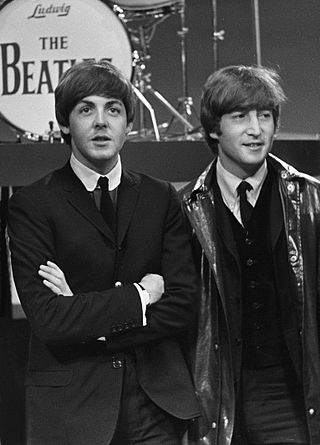
Lennon–McCartney was the songwriting partnership between English musicians John Lennon (1940–1980) and Paul McCartney of the Beatles. It is widely considered one of the greatest, best known and most successful musical collaborations ever by records sold, with the Beatles selling over 600 million records worldwide as of 2004. Between 5 October 1962 and 8 May 1970, the partnership published approximately 180 jointly credited songs, of which the vast majority were recorded by the Beatles, forming the bulk of their catalogue.
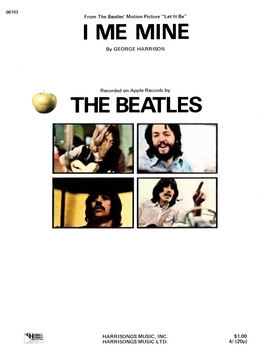
"I Me Mine" is a song by the English rock band the Beatles from their 1970 album Let It Be. Written by George Harrison, it was the last new track the group recorded before their break-up in April 1970. The song originated from their January 1969 rehearsals at Twickenham Film Studios when they were considering making a return to live performance. Written at a time of acrimony within the group, the lyrics lament humankind's propensity for self-centredness and serve as a comment on the discord that led to Harrison temporarily leaving the Beatles. The musical arrangement alternates between waltz-time verses and choruses played in the hard rock style.

"Two of Us" is a 1969 song written by Paul McCartney and credited to the Lennon–McCartney partnership. The song was recorded by the Beatles on 31 January 1969.
"Across the Universe" is a song by the English rock band the Beatles. It was written by John Lennon and credited to Lennon–McCartney. The song first appeared on the 1969 various artists' charity compilation album No One's Gonna Change Our World and later, in a different form, on their 1970 album Let It Be, the group's final released studio album. The original version featured on two different albums both titled Rarities: a 1978 British release and a 1980 US release. It was also included on their 1988 album Past Masters, Volume Two. The song has been covered by many artists, including David Bowie on his 1975 album Young Americans, which featured contributions from Lennon.

"Dig a Pony" is a song by the English rock band the Beatles from their 1970 album Let It Be. It was written by John Lennon and credited to Lennon–McCartney. The band recorded the song on 30 January 1969, during their rooftop concert at the Apple Corps building on Savile Row in central London.

"One After 909" is a song by the English rock band the Beatles from their 1970 album Let It Be. It was written by John Lennon, with input from Paul McCartney, and credited to their joint partnership. The album version is the live performance from the rooftop concert which took place on 30 January 1969. This performance is also included in the Let It Be film. The song was written no later than spring 1960 and perhaps as early as 1957, and is one of the first Lennon–McCartney compositions. "One After 909" is perhaps more reminiscent of early American rock and roll than any of the other songs from the rooftop show, and as a joke for the rooftop chatter, Lennon sings a variant on the opening line of "Danny Boy" after the song is finished.

"Dig It" is a song by the English rock band the Beatles from their 1970 album Let It Be. The song is credited to Lennon/McCartney/Harrison/Starkey, and is one of the few songs to be credited to all of the Beatles. This song and the 39-second "Maggie Mae" appear on the Let It Be album, but are excluded from the Let It Be... Naked album, instead being replaced with "Don't Let Me Down". Glyn Johns' May 1969 version of the album, then titled Get Back, had a four-minute excerpt of "Dig It", which was later reduced to the much shorter version in the final album.

"Don't Let Me Down" is a song by the English rock band the Beatles, recorded in 1969 during the Let It Be sessions. It was written by John Lennon and credited to the Lennon–McCartney songwriting partnership. The band recorded the song with keyboardist Billy Preston; the single release with "Get Back" was credited to "the Beatles with Billy Preston". Originally released as a B-side, producer Phil Spector excluded the song from Let It Be. The song's first appearance on an album was on the 1970 collection Hey Jude.

Let It Be is a 1970 British documentary film starring the Beatles and directed by Michael Lindsay-Hogg. The film documents the group's rehearsing and recording songs in January 1969 for what was to become their twelfth and final studio album Let It Be. The film includes an unannounced rooftop concert by the group, the last public performance of the four together.
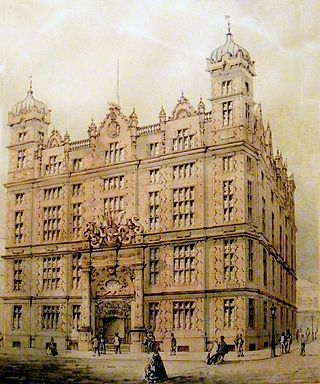
"Maggie May" is a traditional Liverpool folk song about a prostitute who robbed a "homeward bounder": a sailor coming home from a round trip.
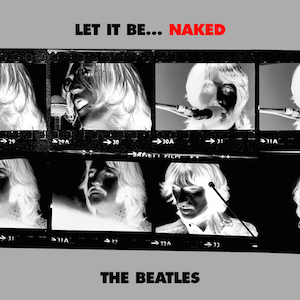
Let It Be... Naked is an alternative mix of the Beatles' 1970 album Let It Be, released on 17 November 2003 by Apple Records. The project was initiated by Paul McCartney, who felt that the original album's producer, Phil Spector, did not capture the group's stripped-down, live-to-tape aesthetic intended for the album. Naked consists largely of newly mixed versions of the Let It Be tracks while omitting the excerpts of incidental studio chatter and most of Spector's embellishments. It also omits two tracks from the 1970 release – "Dig It" and "Maggie Mae" – replacing them with "Don't Let Me Down", which was the non-album B-side of the "Get Back" single.
The song Auf der Lüneburger Heide was composed in 1912 by Ludwig Rahlfs based on a poem from the collection Der kleine Rosengarten by Hermann Löns.
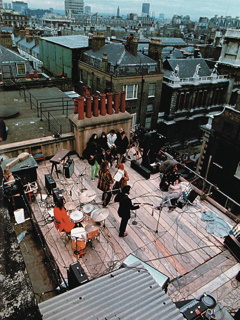
On 30 January 1969, the Beatles performed a concert from the rooftop of their Apple Corps headquarters at 3 Savile Row, in central London's office and fashion district. Joined by guest keyboardist Billy Preston, the band played a 42-minute set before the Metropolitan Police arrived and ordered them to reduce the volume. It was the final public performance of their career. They performed nine takes of five new songs as crowds of onlookers, many on lunch breaks, congregated in the streets and on the rooftops of nearby buildings to listen. The concert ended with "Get Back", and John Lennon joking, "I'd like to say thank you on behalf of the group and ourselves, and I hope we've passed the audition."

Everyday Chemistry is a remix album that was made available as a free digital download on 9 September 2009. The album was released along with a story of anonymous authorship. It mashes up various songs from the Beatles' individual solo careers, including tracks from 27 albums. The album portrays itself as being taken from an alternate universe in which the Beatles had not broken up.

The Beatles: Get Back is a documentary television series directed and produced by Peter Jackson. It covers the making of the Beatles' 1970 album Let It Be and draws largely from unused footage and audio material originally captured for and recycled original footage from the 1970 documentary of the album by Michael Lindsay-Hogg. The docuseries has a total runtime of nearly eight hours, consisting of three episodes, each of duration between two and three hours covering about one week each, together covering 21 days of studio time.
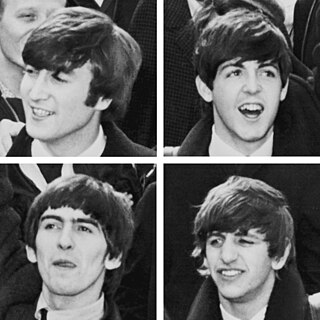
The following outline is provided as an overview of and topical guide to the Wikipedia articles available about the Beatles from their formation through their break-up; it does not include information about members' solo careers.















